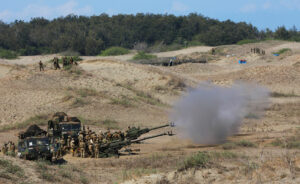By Kenneth Christiane L. Basilio, Reporter
THE Chinese government on Monday said ongoing joint military drills between Philippine and US forces threaten regional stability, opposing the use the “Taiwan question” to justify military preparations.
“With the world being hit by unilateralism, protectionism and bullying, countries in this region have been calling for greater solidarity, coordination, and joint efforts to keep the region stable and respond to challenges,” Chinese Foreign Ministry spokesman Guo Jiakun told a news briefing in Beijing, based on a transcript posted on the agency’s website.
“Against this backdrop, the Philippines chose to conduct the large-scale military drills with this country outside the region and brought in strategic and tactical weapons to the detriment of regional strategic stability and regional economic prospects,” he added, alluding to the US.
“This act has been detested and opposed by regional countries.”
Philippine and US forces on Monday started their three-week, annual combat drills set to be staged near key locations facing regional flashpoints like the South China Sea and Taiwan. This year’s exercise will involve about 14,000 troops, with participation from nations such as Australia, Canada and France.
Started in 1991, the Balikatan exercise has evolved into Southeast Asia’s premier combat rehearsal as the Philippines and US seek to strengthen security cooperation and enhance force interoperability in response to China’s growing assertiveness in the region.
The US military has brought a variety of advanced weaponry for the drills to enhance military preparedness, including mobile anti-ship missile systems, portable artillery rocket systems and short-range air defense platforms, while making use of a mid-range capability missile battery that remained in the Philippines after last year’s exercises.
The South China Sea has become a regional flashpoint as Beijing continues to assert sovereignty over almost the entire sea, seen as a vital global trade route that is believed to be also rich in undersea gas and oil deposits.
Philippine and Chinese forces have repeatedly sparred over competing claims in the sea, with tensions flaring around disputed maritime features such as the Spratly Islands and Scarborough Shoal.
Washington has pledged to work with the Philippines to help ramp up deterrence against China’s aggression in the South China Sea, with US Defense Secretary Peter Brian Hegseth vowing in late March to support Manila with funding to boost its military modernization efforts.
The Philippine military is seeking to counter China’s military might in the region by undertaking a modernization program called Horizons and has earmarked at least $35 billion (P2 trillion) for its military build-up in the next decade.
Mr. Guo said the “Taiwan question” is China’s internal affair and is at the core of its national interest.
“China firmly opposes any country using the Taiwan question as an excuse to strengthen military deployment in the region, heighten tensions and confrontation, and disturb regional peace and stability,” he said.
“We urge relevant sides not to make provocation on the Taiwan question. Those who play with fire will perish by it,” he added.
Beijing lays claim over Taiwan and it has not ruled out the use of force to annex the self-governed island. The Chinese military has routinely staged air and naval military drills near the island.
Philippine and US military generals on Monday said the Balikatan exercises are not aimed at countering an invasion of Taiwan by China. These are meant to address broader “regional security challenges,” according to US Lieutenant General James F. Glynn, exercise director for the US side.
But an invasion of Taiwan is not “conducive to a free and open” South China Sea, he told reporters after the drill’s opening ceremonies at the Philippine military headquarters near Manila on Monday.
“If ever there is a conflict in Taiwan, the Philippines will not participate,” Philippine Major General Francisco F. Lorenzo, exercise director on the Philippine side, told reporters at the same event.
